Haunted by his eyes
Kabul, March 21, 2016 -- In my seven years with AFP, I have witnessed plenty of human cruelty.
In Baghdad, I saw the bodies of regular people torn apart by bombs. In in US state of Virginia, an execution of an African-American on death row revealed a system that seemed more interested in exacting revenge than justice. But nothing, not even the bloodied bones of Iraqis on the pavement following bombings, could have prepared me for what I and AFP photographer Wakil Kohsar saw on Saturday, March 12.
That morning, we learned that a dozen bodies of Afghan migrants who had drowned in the Aegean Sea were arriving back in Kabul for burial. Their boat had capsized between Turkey and Greece, killing three generations of a family.
The migrant crisis has become an important part of our coverage now that Afghans, along with Syrians and Iraqis, are among the top nationalities trying to enter Europe in search of a better life. We had been focusing on telling the stories of Afghans leaving the country or of those who came back bitter and disappointed after a chillier than expected reception in Europe. Up to that point, we had never tried to put a face on the grim statistics of the number of migrants who drowned trying to make the journey.
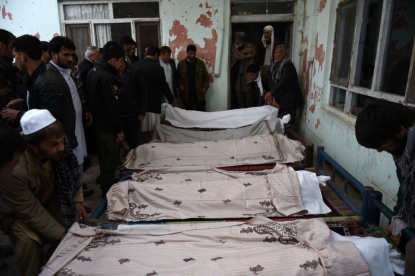 Mourning. (AFP / Wakil Kohsar)
Mourning. (AFP / Wakil Kohsar)Wakil and I hurried toward the airport, but got there too late, just missing the coffins. We needed to find a home where, according to Islamic tradition, the bodies of the deceased would be prepared for burial by loved ones. Wakil, a man of innumerable resources and a vast contact list, soon had us on our way to one such house.
I have lived in Muslim countries before but had never been present for a burial rite, in which the body of the deceased is washed and placed into a shroud. I wanted to be able to describe for my readers the feelings I would see etched on the faces of the loved ones of those who died. But I had no idea what to expect.
Elders crying
After we arrived at our destination, the Skanderi family home, we walked a hundred meters to the front door. On the way, I saw men walk out of the house’s courtyard, elders who must have seen and lived it all during their years in war-torn Afghnistan -- war, treachery, death. They were crying. That’s when my legs started to shake. I told myself I had to be able to empathize without losing my own composure.
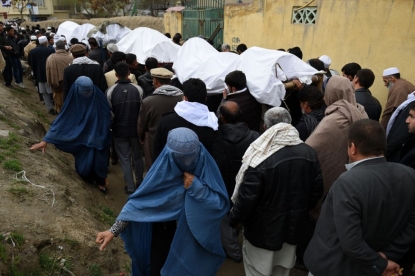 The funeral procession. (AFP / Wakil Kohsar)
The funeral procession. (AFP / Wakil Kohsar)Inside, at the front of the house, half a dozen people were washing the body of the head of the family. The Hajji, an Arabic term of respect conferred on those who have made the pilgrimage to Mecca, had drowned along with nine members of his family. His nude body was too thin and shiny from the water. A man nearby, clearly shaken, whispered a prayer.
I saw Wakil weave through the crowd of men (only men are allowed to be present when a male body is being washed and shrouded). He motioned for me to follow him.
The smallest coffin
Four open coffins, made from cheap wood, lined the wall near the back of the room. Each body was inside a black bag, closed all the way to the person’s chin. The oldest seemed to have been about 15 years old. The youngest was hard to miss. The coffin of Faiz, nine months old, was the smallest.
Nearby an uncle pushed a bunch-up scarf into his mouth to stifle his sobs. Another man, Mohammed Ashraf, a close friend of the family, had tears streaming down his cheeks, his face weary with age.
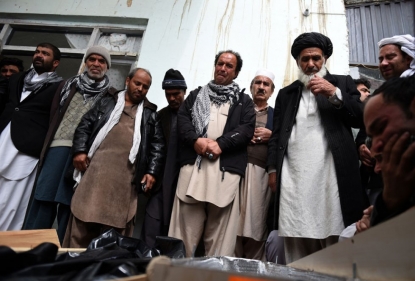 Mourners. (AFP / Wakil Kohsar)
Mourners. (AFP / Wakil Kohsar)Baby Faiz, a fine mop of auburn curls covering his head, lay there, his eyes strangely half closed, as if he was trying to see something too far away. He seemed to be smiling reassuringly and seemed so alive that I thought of “The Sleeper in the Valley,” the poem by French artist Arthur Rimbaud about a dead soldier who looks like he’s merely resting.
I grew numb staring at Faiz’s tiny body. Faiz who hadn’t asked for anything, least of all to make the hellish trip across the Aegean Sea where nearly 400 people have similarly perished since the beginning of the year. His father, who survived the accident, was recovering in Turkey.

Like thousands of Afghans, the Skanderis went in search of a better life for themselves and their children. I learned from Mohammed Ashraf that the family “did not have dire financial troubles. It’s destiny that pushed them to leave. God had wanted this.” They planned on joining an uncle living in Austria, who had moved there years ago. They wanted to start over, far away from war that’s been tearing their country for years.
It was the uncle who had paid smugglers thousands of dollars to get the family to Europe. And it was he who paid for their bodies to be flown back to Kabul to be buried.
Wakil and I stayed silent on the drive back, held together by a sort of unwritten code that bound those who have seen the worst humanity has to offer. After 10 minutes, Wakil breathed: “Afghans see this tragedy but it doesn’t stop them from leaving. They are desperate.”
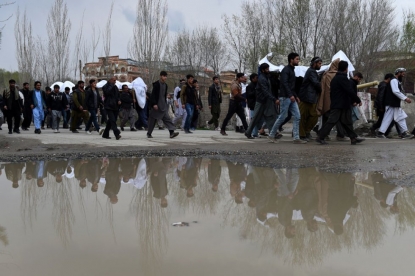
Warfare, attacks by the Taliban and Islamic State, corruption, unemployment, these were among the problems that pushed Afghans to flee their own country despite the many risks associated with the journey: smugglers, unpredictable weather, and of course, the rough waters of the Aegean.
I am haunted by Faiz’s face and the fervent prayers from all those strong men I had seen in the house. In a country where civilians and soldiers die every day in combat and as a result of attacks, I thought I had grown used to the presence of death. The prone body of a nine-month-old proved me wrong. We live with it, yes, but we never get used to it.
Guillaume Decamme is a journalist in AFP’s Kabul office. Follow him on Twitter.
This blog was translated from French by Solange Uwimana in Paris. Read the original here.
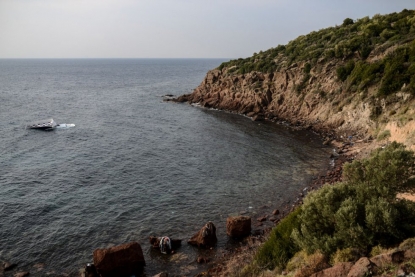 A boat that capsized with migrants aboard is seen off the coast of Turkey on January 31, 2016. (AFP / Ozan Kose)
A boat that capsized with migrants aboard is seen off the coast of Turkey on January 31, 2016. (AFP / Ozan Kose)

